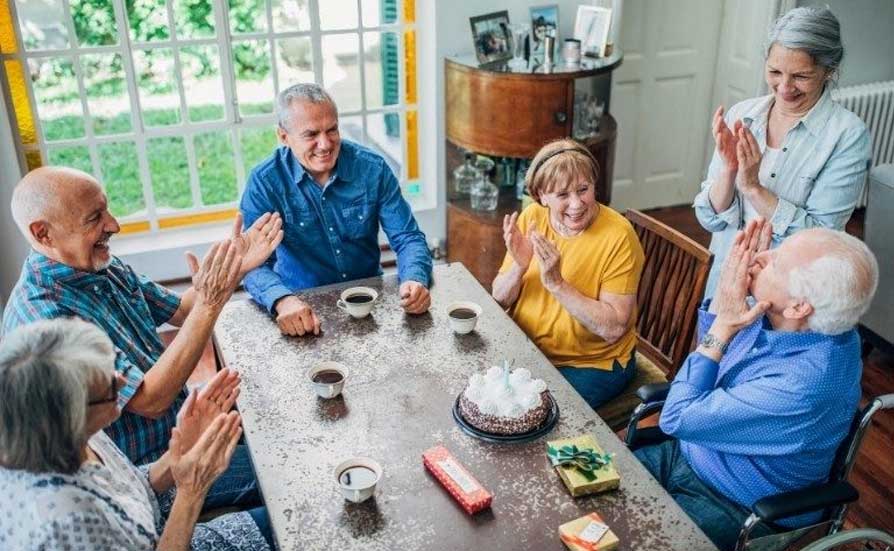
5 Healthy Comfort Foods with Proven Benefits
April 14, 2021
Hospice Volunteers: Making an Impact in People’s Lives
April 16, 2021Memory Care: A Short Guide for Families
Memory care is a specialized medical service for people living with dementia. It is a progressive disease, so symptoms grow steadily worse over time. During the early stages of dementia, it is possible for most people to live independently. But eventually the disease makes this impossible. As symptoms progress, they will not only lose their memories, but their basic knowledge of self-care. They might recognize a toothbrush, for example, but forget what to do with it. The same will be true for bathing, grooming, and dressing. In the latter stages, even chewing and swallowing will become a challenge.
When this happens, providing full-time care can be a struggle, particularly for families with other responsibilities such as career and children. The demands often place a great deal of physical and emotional stress on relatives, who have not been trained to manage dementia symptoms. During their decline, dementia patients often become aggressive, suspicious, and anxious. Their environment must be monitored to prevent them from becoming upset or wandering off. Not to mention the steadily mounting medical concerns caregivers must keep track of.
Memory care offers families relief from these concerns. It is a safe and nurturing environment for people whose condition requires close, personal attention and round-the-clock assistance. Staff are knowledgeable and competent. What’s more, they treat residents as individuals, with a care plan built around their specific physical, mental, and emotional needs

Benefits of memory care
Though it is similar to elderly care services found in assisted living facilities, memory care is unique because it supports every aspect of a resident’s well-being. Rather than merely assisting them, memory caregivers work to keep residents engaged, active, and independent, to slow the progress of their disease as much as possible. Using information about their background, abilities, and symptoms, caregivers create person-centered strategies that respond to changing circumstances.
Trained support
For residents, quality of life depends on the attention and support of their caregivers, who are trained to assess each person’s mental, physical, medical, behavioral, communication, and decision-making faculties. This deep understanding allows them to shift their approach as the disease advances, creating personalized routines that promote health, stimulate cognition, and deal with troublesome behavior.
24-hour care
The course of dementia is not predictable. Patients who start out calm and highly functional in the morning may become confused, anxious, and hostile in the afternoon. Night brings its own challenges, which is why memory care operates 24 hours a day. Regardless of whether your loved one is in an intimate nursing home or assisted living facility, help is always close at hand.
Memory care providers assist residents with activities of daily living such as bathing, grooming, toileting, dressing, moving, and eating. They also comfort them during the night if they become disoriented or wake up to use the bathroom. However, they are careful never to step in unless the resident asks or requires help. Encouraging residents to take charge of their personal routine is one of the best ways to preserve their abilities. In similar fashion, caregivers at Verona Court, Parentis Health’s residential care home, also try to keep residents involved in the life of the house. For example, they might ask them to set the table, fold laundry, or sort silverware.
Nutrition & hygiene
Poor eating is a common feature of dementia. Due to memory loss, people forget to eat or lose the ability to recognize hunger and thirst. In other cases, they cannot safely operate stoves or carry pots and pans. When this occurs, rapid weight change usually follows – one of the signs a person needs assisted living.
In memory care, however, staff monitors the residents’ food intake. They not only watch how much each person eats, but also checks to ensure they are chewing and swallowing. (In late-stage dementia, this process is not automatic like it is in healthy people). Residents are served three healthy meals a day and caregivers take every effort to prepare food that accommodates their tastes, culture, and medical conditions. Verona Court reaches out to families to discuss their loved one’s favorite meals and will cook separate dishes if a resident does not like what is being served.
As with nutrition, poor hygiene is another common feature of dementia. People either forget to wash or lose interest in keeping themselves clean. Therefore, one of the primary tasks in memory care is to make sure each resident is bathed, groomed, and dressed in clean clothes every day. In many cases, the resident can be prompted to clean themselves, if the caregiver demonstrates the proper procedure. Sometimes, with the right encouragement, a person struggling with one task (e.g., showering) can perform a different one, such as combing their hair.
Health & wellness
People with dementia have a higher risk of infection, caused either by memory loss, diminished physical strength, or both. Dehydration and poor hygiene lead to urinary tract infections, while bed-bound patients who have trouble clearing mucus often come down with pneumonia. Skin ulcers (bedsores) are also a common problem. They can become septic, which leads to further complications.
Memory care addresses these concerns by monitoring fluid intake, cleaning residents daily, and turning them every few hours if they are confined to bed. Caregivers are trained to recognize these problems and quickly reach out to medical providers for treatment. What’s more, because some residents cannot express themselves clearly, caregivers are taught how to identify problems through body language and behavior (I.e., writhing, grimacing, pacing, tugging at clothing).
Socialization
Even though dementia affects people’s memories and personality, they are still capable of joy and growth. Above all, they desire friendship and enjoy forming close connections with the people around them. Sadly, there is little opportunity for them to do this in assisted living facilities that do not include memory care. Because dementia patients have trouble interacting with seniors who are fully independent, they often end up isolated and alone.
By contrast, memory care provides them with ample opportunity to socialize and make friends. In communities like Verona Court, residents are a close, tightly-knit group. The facility feels more like a home instead of a hospital. Caregivers live on site and our nurses choose residents carefully in order to make certain the house functions like a family. They eat together, share common living spaces, and take part in activities planned by the staff.
Unlike other assisted living facilities, the care taken to create this type of friendly environment also allowed memory care units like Verona Court to weather COVID-19 with relative ease. Because small and intimate groups promote socialization, the population in our homes never rose above the limits set down by state and local health agencies. Instead of sheltering in their rooms, residents continued mingling as if nothing had happened. This meant their physical and mental health were both protected, while seniors elsewhere were forced to isolate.
Family bonding
Lastly, memory care takes pressure off the resident’s children and grandchildren. Rather than worrying about their loved one, they are free to visit and be a family again. The structured and relaxed environment makes visiting simple. Families can talk, laugh, and have fun, just like they would at home.
Best environments for memory care

Even though memory care is provided by assisted living facilities, the two are not synonymous. In reality, memory care requires markedly different structure and training beyond a standard retirement community. When deciding on full-time care, keep these factors in mind to make sure your loved one receives the support they deserve.
Small setting
Small environments foster community and build strong relationships between residents and caregivers. Because dementia behavior is specific to each individual, quality support relies on these types of bonds. Caregivers can make better care and provision when they understand a resident’s nuances and recognize signs of problem behavior, such as sundowning and wandering. (Learn more about sundowning.) They can then redirect them with positive action, such as turning on music, holding their hand, or giving them a snack.
For example, when one resident at Verona Court became agitated, our caregivers gave him a stethoscope to play with. Apparently, it triggered some recognition in him, because sitting and listening to the caregivers’ heartbeats calmed him down. In another instance, a nurse found that a resident who resisted bathing suddenly became cooperative when she handed him a couple of muffins. So, she made them part of his everyday routine.
Secure environment
To do well, residents need an environment that is both comfortable and secure. Dementia affects spatial awareness and coordination, which puts them at risk of falling. A simple layout decorated with plain, uniform colors will keep them safe. Check to make sure the floors are even as well. Examine the entryways and hallways too. Even though your loved one might not use a walker or wheelchair, they may have to in the future.
Locks on the outside doors and windows are also important, to prevent residents from wandering away. However, it is important to remember not all wandering is bad. Walking is one of the best ways to promote fitness in elderly people, so homes designed for freedom of movement are good. Backyards are even better because they give residents a chance to enjoy sunlight and fresh air without leaving the community. Overall, the environment should encourage movement that promotes mobility, sociability, and independence, while also protecting safety and preventing residents from exiting the premises without supervision.
Stimulating atmosphere
Meaningful interactions and activities stimulate mental health, which is why games and entertainment should be a part of every memory care program. Music, dancing, cooking, and arts and crafts are popular with residents, but whatever is offered, it is important it reflects their interests. Programs that provide only one activity for the entire house will not be able to hold the resident’s attention for long.
In addition, chores are a great way to promote the residents’ dignity and self-worth. Regardless of their condition, no one wants to feel like a burden. Residents who have opportunities to contribute to their own care have greater confidence, better functional abilities, and higher self-esteem.
Low care ratio
The ratio of caregivers to residents has a big impact on the quality of the care they provide. Obviously, the more caregivers there are for each resident, the more attention and assistance they will receive. At Verona Court, we have one caregiver for every three residents.
Coordination of care
Effective memory care involves caregivers, physicians, and families working together to support residents. To create an effective care plan, they need to share their knowledge of the resident’s history, health, cognitive status, physical abilities, and general behavior. At first, caregivers will rely on the family for this information during the resident’s initial assessment. Over time, however, roles will reverse. Family and physicians will rely on caregivers to keep them up to date on the resident’s condition and note significant changes affecting their health. This not only increases the family’s peace of mind but also ensures they remain active partners in care.
Family members should ask about the caregivers’ training and background to make certain they understand how to communicate with physicians. The administrators at Verona Court, for example, are fully qualified nurses. Consequently, they understand the disease, its symptoms, and prescribed treatment methods. They subsequently train their staff to track, identify, and respond to issues. Because of the difficulty getting people with dementia to the doctor, most memory care units invite doctors to come and treat patients in the home. When this happens, Verona Court’s hands-on management speeds treatment by providing doctors with details on the resident’s condition and behavior.
Patient-centered
Finally, memory care needs to be flexible. Caregivers need to meet patients where they are, in order to respond productively to daily changes in their needs and attitude. Although disease processes are predictable, how it presents is not. Monday could be quite different from Tuesday and very different from Wednesday. Therefore, caregivers need the ability to adapt and that can only happen in a small, family-oriented setting that rejects rigid routines and puts residents first.
Memory loss is disorienting, which is why people suffering from it respond so well to routine. The fewer surprises they have, the less anxious they are. In order to keep patients relaxed, days need a flow. However, this does not mean they follow a pre-determined schedule. Instead, patient-centered homes build routines around individuals.
For instance, at Verona Court, if a resident has a bad night, they are allowed to sleep in, and their day is adjusted accordingly. Caregivers provide baths, meals, and activities at alternate times and may even call in additional help to make sure these demands do not affect the other members of the house. With this kind of attention, caregivers empower patients, giving them a substantial role in guiding their own care.
Enhancing quality of life
There is sometimes a misplaced sense of guilt when a family decides to entrust a loved one to memory care. In truth, to maximize quality of life, memory care is one of the best decisions you can make for them. It is an environment where they are treated as individuals with unique needs. Caregivers validate their experience and work to understand the world from the patient’s perspective, so they can build enriching relationships and achieve their greatest well-being.

